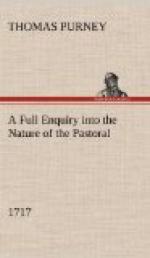Shepherds are indeed suppos’d to be happy, and devoid of Stir, and Noise, and Bustle; but does it follow, that there are no Actions or Incidents in a Shepherd’s Life? If there are delightful Actions, ’tis plain we don’t run counter to a Shepherd’s Life in drawing ’em into Poetry; and Poetry imitates the Actions of Men. Which show’s that these ordinary Pastorals are no more Poetry, than Lucretius is, or than any other Philosopher, if turn’d into Verse, would be. Sure I think, as we allow an Epick Writer to take his Hero in that Part or Character of his Life, where he will make the best Figure in Poetry, so we should allow a Pastoral-Writer the same Opportunity of pleasing.
’Tis necessary also that several lesser Actions work up to the main One; that the whole Piece may be fill’d with Circumstances. ’Tis the very Soul of Poetry to imitate Actions; to lead the Mind thro’ a Variety of Scenes; and to present a Number of Pictures before it.
’Tis plain a Shepherd’s Life has as many Incidents, as other Person’s; only one Kind are in low Life, the other not. The Simplicity of Pastoral is nothing touch’d by this, if these Incidents are Pastoral: For the difference between Epick or Tragick Poetry, and Pastoral, must not proceed from the One haveing many, the other no Under-Actions, but rather from the different Actions, which a Hero and a Swain are engag’d in. A Shepherd’s leading his Lass to a Shade, and there sticking her Bosom with Flowers, is the same in Pastoral, as an Hero’s hurling a Javelin, is in Epick Poetry. And a variety of Circumstances and Actions is equally necessary in both Pieces. Or perhaps in Pastoral most; since the Coolness and Sedateness of Pastoral is very apt to sate and tire the Reader, if he dwell’s long on one Action; and we can bear a longer Description of a Battle than of two Shepherd’s sitting together; because the first fill’s and actuate’s the Mind the most; and where it is so much employ’d, it cannot so easily flag and grow dull.
SECT. 2.
Whether the Pastoral Fable should be simple or complex; and how it must differ from the Epick Fable.
The Implex Fables are to me, in all Poetry, the finest. And even Pastoral may receive an additional Beauty from a Change of Fortune in the chief Character, if manag’d with Discretion. ’Tis not easy to give direct Proofs for things of this Nature. But what little I have to offer for Pastoral’s requiring an Implex Fable, is as follows.
Pastoral, like all Poetry, should aim at Pleasure and Profit. Pleasure is best produc’d, if the Poem raises Pity, or Joy, or both; and Profit by its having a Moral. Now the Implex Fable attain’s it’s End the easiest. For we pity Misfortunes no where so much as in one we saw but lately happy: Nor do we joy to see a Man flourish; but to see him rise from Ills to a flourishing Condition, rejoyces the Mind. And as for the other End of Poetry, which is Profit, every one may see that Implex Fables are greatly best for producing a Moral.




